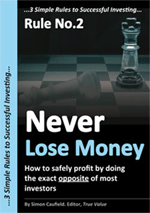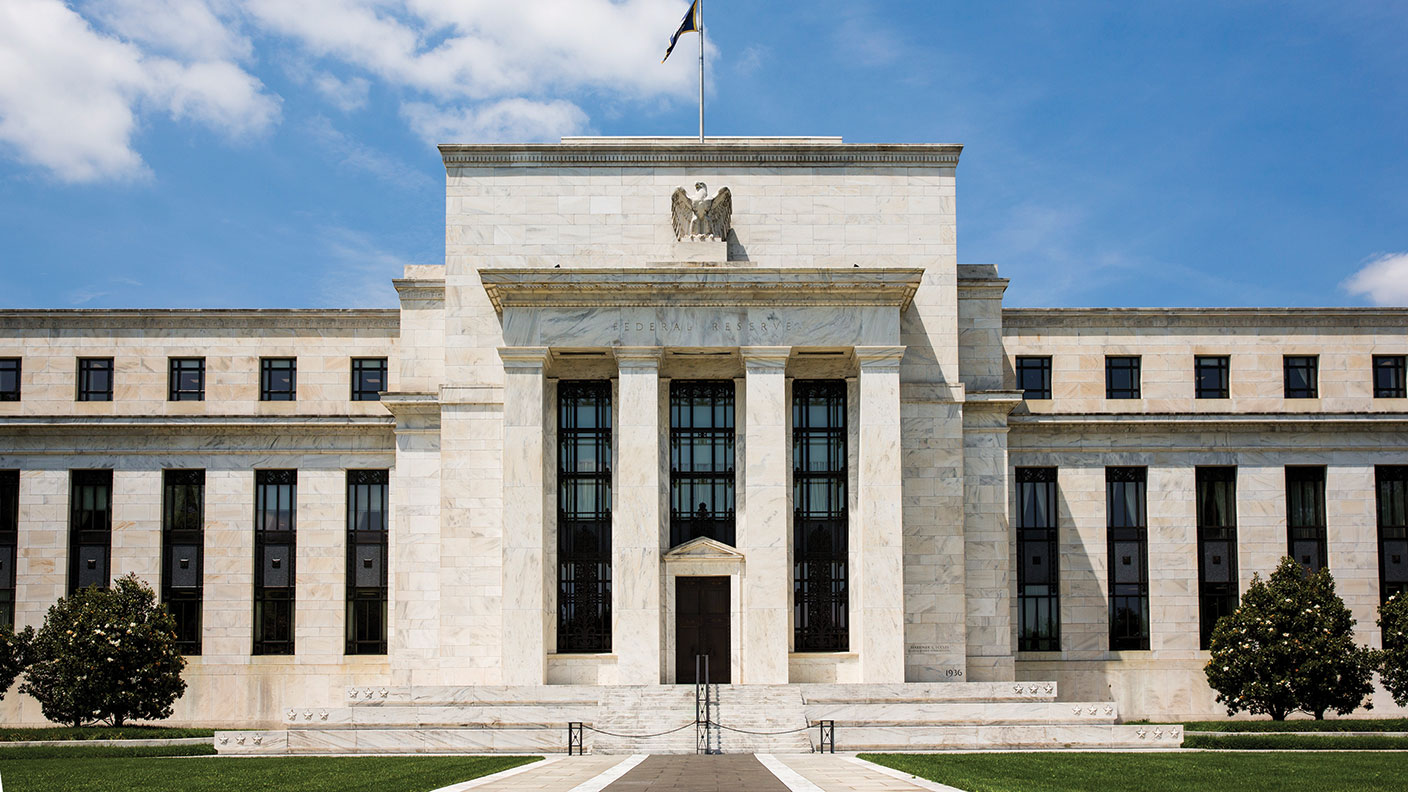How much gold should you own?
Gold's value keeps setting new records with investors buying the yellow metal as though it were going out of fashion. But how much gold should you really have in your portfolio? Bengt Saelensminde explains.
Get the latest financial news, insights and expert analysis from our award-winning MoneyWeek team, to help you understand what really matters when it comes to your finances.
You are now subscribed
Your newsletter sign-up was successful
Want to add more newsletters?
In the last Right Side I told you about a fascinating discussion I had with Simon Caufield in Paris recently. We talked about the City. And we talked about the best ways that you, as a private investor, can exploit the City's greatest flaws.
Today I want to talk about gold. Both Simon and I are big fans of the yellow metal. Both of us have big holdings. But Simon stumped me with his rationale for buying gold. It came as quite a shock.
If you're a gold bug, what he said should go a long way to confirming the importance of gold right now. And if you aren't, let me just explain how you could be leaving yourself exposed.
Try 6 free issues of MoneyWeek today
Get unparalleled financial insight, analysis and expert opinion you can profit from.

Sign up to Money Morning
Don't miss the latest investment and personal finances news, market analysis, plus money-saving tips with our free twice-daily newsletter
Don't miss the latest investment and personal finances news, market analysis, plus money-saving tips with our free twice-daily newsletter
Why I think gold is a great insurance policy
One of the most important lessons for a long-term investor is a simple one. It may sound trite, but it's the cornerstone to securing your financial future. And that is: Don't lose money.
Now, gold deriders - of whom there are many - may take a gulp at this point. What has owning gold got to do with the idea of never losing money? After all, isn't gold a volatile investment? Surely you can lose your shirt in the gold market!
Well, yes. But Simon and I play the long game. And we are definitely agreed that holding gold insurance is definitely part of our 'don't lose money' strategy.
The beauty of gold is that it can provide the sort of insurance against financial disaster that simply isn't available from most other investment classes. And we may be a lot closer to financial disaster than you think.
Another big bank is close to collapse
If you read my recent note on dollar demise you'll have a fair idea about my main reason for holding gold. The dollar is deflating. As more of them are created, each one becomes worth less compared to tangible goods.
But Simon gets a little punchier on the subject. He reckons something is brewing that will hasten the demise of the dollar.
Simon tells me he's been doing some research into the world's third largest bank. He says that it is very close to collapse. And that could have very grave implications for the dollar. Why? Because this bank is the Federal Reserve Bank of the USA.
According to Simon's research, it has reached a point where its liabilities far outweigh its assets. "A 2% fall in the value of those assets would wipe out every last dollar of capital. It may already be insolvent"
"Hang on a minute", I said, "The Fed is a government institution - a lever of the state. It can't go bust!"
And Simon, cautious as ever, kind of agreed. "Yes, ok. But the Fed is a separate institution and most importantly it's a bank like any other. If its liabilities grow larger than its assets, then it is technically insolvent. And that's regardless of who owns it and how it's regulated."
And he has a point. The Fed's liabilities are certainly growing while its assets are starting to look a little shaky.
Quantitative easing (QE) amounts to the Fed printing new money and using it to buy debt mainly issued by government. By doing so, it creates a liability (the amount of money it prints) and it gains an asset (the government bonds). But now that this government debt is falling in value, the Fed's balance sheet is shot.
"If the Fed isn't already insolvent, it soon will be."
So why isn't everyone running for the hills?
Now this is big news. And if it's true, surely it would mark the end of the financial system as we know it. But the Fed has a 'get out of jail free card'. and Simon knows it. In fact, it's a real stinker. Because the Fed isn't like any other bank, it runs its accounts differently too. Unlike any other business, the Fed doesn't acknowledge losses.
But of course they'd have to report these losses if they ever sold their bonds. And that's why (despite what we're told), the Fed isn't going to sell. Who would buy US T-bills in that sort of quantity anyway?
"No Sir" says Simon, what's likely to happen is this: if bonds carry on down, then before long it'll be obvious to everyone that the Fed is bust. So what can they do? Simple: They'll get a bail-out. The US treasury will have to recapitalise the Fed
"But the treasury has no money", I venture,
"Exactly" Simon's eyes grow wider. "so they borrow it by issuing new debt."
"But who will buy these new bonds?" I say. Already I know what Simon's going to say.
"The Fed of course!"
Between the Fed and the Treasury, they'll simply create some more dollars and bonds. Now there's a Ponzi scheme to make Madoff green with envy. A veritable merry-go-round of money creation. And what's that going to do to the credibility of the dollar? It could accelerate its downtrend. And as it does it'll likely drag most Western currencies down with it.
What do you do when money itself is under threat?
You need to take out insurance
Well, I think you know what the answer is. Take out some insurance. And that insurance is gold. Simon advocates 10% to 12% of your portfolio.I think that's quite a bearish stance. I've been working on between 5% and 10%. I reckon that'll provide decent cover if the worst comes to the worst. But then again, if you're like me and hold quite a commodities centric portfolio, then you've already got some cover.
The key here is to look at the overall balance of your portfolio. If you are reliant on the performance of bonds and other cash-like investments, then arguably you should take out more insurance.
Sure gold can go down. But if it does, then the likelihood is that financial meltdown has been avoided. The rest of your portfolio is intact. That's insurance for you, if you don't claim, you lose the premium.
Have a read of this fascinating report
I am a firm believer in the 'never lose money' approach. But it's not always easy to achieve.

On Friday I'll be reporting the last part of my discussion with Simon. It's all about assessing the true value of a stock. I'll also be revealing a tip on a stock we're both dead keen on right now.
But for the moment, I'd recommend downloading the 'Never lose money' report. More than that, do try to make it a habit.
This article was first published in the free investment email The Right side. Sign up to TheRightSide here.
Important Information
The FSA does not regulate certain activities. This includes the buying and selling of commodities. Your capital is at risk when you invest in shares - you can lose some or all of your money, so never risk more than you can afford to lose. Always seek personal advice if you are unsure about the suitability of any investment. Past performance and forecasts are not reliable indicators of future results. Commissions, fees and other charges can reduce returns from investments. Profits from share dealing are a form of income and subject to taxation. Tax treatment depends on individual circumstances and may be subject to change in the future. Please note that there will be no follow up to recommendations in The Right Side.
Managing Editor: Frank Hemsley. The Right Side is issued by MoneyWeek Ltd.
MoneyWeek Ltd is authorised and regulated by the Financial Services Authority. FSA No 509798. https://www.fsa.gov.uk/register/home.do
Get the latest financial news, insights and expert analysis from our award-winning MoneyWeek team, to help you understand what really matters when it comes to your finances.
Bengt graduated from Reading University in 1994 and followed up with a master's degree in business economics.
He started stock market investing at the age of 13, and this eventually led to a job in the City of London in 1995. He started on a bond desk at Cantor Fitzgerald and ended up running a desk at stockbroker's Cazenove.
Bengt left the City in 2000 to start up his own import and beauty products business which he still runs today.
-
 How a dovish Federal Reserve could affect you
How a dovish Federal Reserve could affect youTrump’s pick for the US Federal Reserve is not so much of a yes-man as his rival, but interest rates will still come down quickly, says Cris Sholto Heaton
-
 New Federal Reserve chair Kevin Warsh has his work cut out
New Federal Reserve chair Kevin Warsh has his work cut outOpinion Kevin Warsh must make it clear that he, not Trump, is in charge at the Fed. If he doesn't, the US dollar and Treasury bills sell-off will start all over again
-
 'Investors should brace for Trump’s great inflation'
'Investors should brace for Trump’s great inflation'Opinion Donald Trump's actions against Federal Reserve chair Jerome Powell will likely stoke rising prices. Investors should prepare for the worst, says Matthew Lynn
-
 'Governments are launching an assault on the independence of central banks'
'Governments are launching an assault on the independence of central banks'Opinion Say goodbye to the era of central bank orthodoxy and hello to the new era of central bank dependency, says Jeremy McKeown
-
 Do we need central banks, or is it time to privatise money?
Do we need central banks, or is it time to privatise money?Analysis Free banking is one alternative to central banks, but would switching to a radical new system be worth the risk?
-
 Will turmoil in the Middle East trigger inflation?
Will turmoil in the Middle East trigger inflation?The risk of an escalating Middle East crisis continues to rise. Markets appear to be dismissing the prospect. Here's how investors can protect themselves.
-
 Federal Reserve cuts US interest rates for the first time in more than four years
Federal Reserve cuts US interest rates for the first time in more than four yearsPolicymakers at the US central bank also suggested rates would be cut further before the year is out
-
 The Bank of England can’t afford to hike interest rates again
The Bank of England can’t afford to hike interest rates againWith inflation falling, the cost of borrowing rising and the economy heading into an election year, the Bank of England can’t afford to increase interest rates again.

